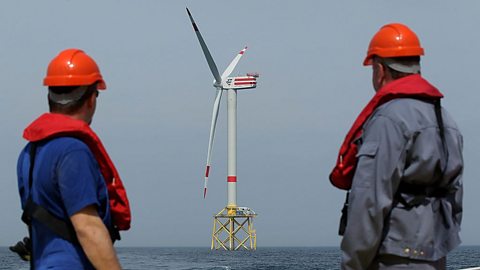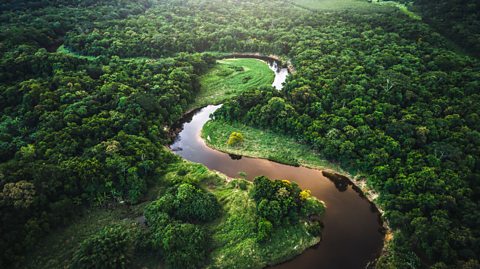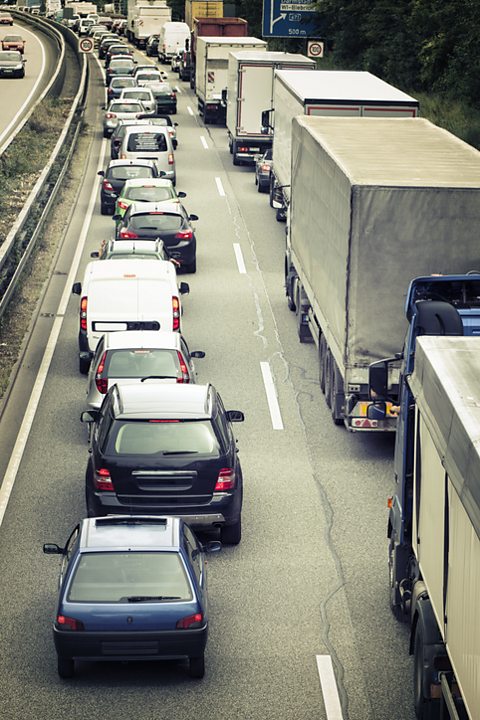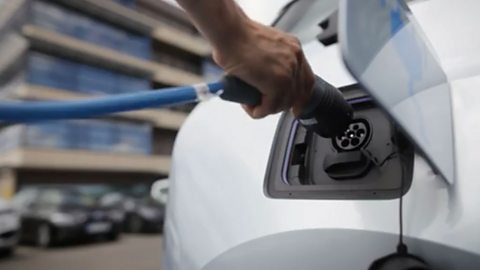This article was published in June 2019
A quarter of Britain covered in trees, quieter roads, healthier lifestyles and holidays by high-speed rail. Thatтs how the United Kingdom could look as a result of its bid to be carbon neutral by 2050.
The UK is the first major nation to formally back a pledge to cut carbon emissions to practically zero in just over 30 years. As well as clearing the air of harmful fumes, the scheme - according to one expert in climate change - will also have surprising knock-on effects for the population as a whole.
Dr Jaise Kuriakose is a lecturer in energy and climate change at the University of Manchester who believes the governmentтs target is entirely achievable as long as the groundwork is put in as soon as possible. He spoke to ДѓЯѓДЋУН Bitesize about some of the changes we could see in everyday life in an attempt to make that reduction happen.
What does carbon neutral actually mean?
Dr Kuriakose says: тZero carbon, carbon neutral, net zero, theyтre all kind of similar. Itтs often confusing for the general public. The overall objective is that our carbon emissions have to be zero.

тItтs mainly human activities where carbon emissions come from. The heating at homes and offices and the electricity used in that. Then thereтs transport and the burning of petrol and diesel involved in travelling on a train or aviation or the shipping of goods that we buy. Industrial processes produce carbon emissions too, such as steel production.т
The new pledge from the government aims to avoid carbon emissions completely by 2050, or have the capability to remove it safely from the atmosphere, known as 'carbon offsetting'.
Becoming тcarbon zeroт
There are already alternatives the public can turn to which donтt involve carbon emissions. Renewable energies such as solar and wind power result in zero carbon and using electric-powered public transport, including trains and trams, also means fewer toxins pumped into the atmosphere.
Itтs industry which will prove the toughest nut to crack due to the levels of energy involved in the production process of so much food and household products. While research continues into reducing these levels at source, nature itself is providing part of the solution.

тIf you plant lots of trees,т Dr Kuriakose explains, тthey absorb some of the CO2 from the atmosphere and some of the emissions can be eliminated.
тIn the UK we are looking at land use change for forestry, planting more trees and protecting the environment. The committee on climate change is arguing we need to be more ambitious, we need to plant more, something like 25 per cent of the land should be planted with trees. Even then it wouldnтt be enough to absorb all of our emissions.т
In the meantime, major companies are being urged to make their premises as energy efficient as possible, reduce their reliance on fossil fuels and look to switching to renewable energy providers. Carbon capture is another process. Up to 90% of waste carbon is trapped and captured at source from large factories and power plants before it can enter the atmosphere and taken to a storage site where it can be safely contained.
Cutting back on aviation pollution
Predicting changes in aircraft technology twenty years from now is tricky, says Dr Kuriakose, but itтs likely that long-haul flights will be powered by biofuels (made from living matter, such as crops) while an alternative way of reaching mainland Europe will cut back on emissions even further.
тBetter connectivity around Europe would mean high speed rail,т Dr Kuriakose says. тHolidays in Europe could be done by rail but thatтs not achievable if you want to go to Australia, and thatтs where we would look to biofuel which can be made to a similar grade as the petrol we use now.т

Making the nationтs roads healthier
Exhaust fumes would need to become a thing of the past in a carbon neutral nation (the UK is already committed to halting production on petrol and diesel cars by 2040) and, again, itтs where a renewable force would take its place.
Dr Kuriakose says: тLight duty vehicles such as cars and smaller vans can be electric. I wouldnтt say that all 31 million cars in the UK should be converted to electric cars tomorrow but we do need a better transport infrastructure. That includes better trains used by more people so fewer cars are needed. More cycle lanes would mean shorter journeys through cities [A study by Massachussetts Institute of Technology in Lyon showed how cycling is a quicker, more efficient mode of transport through the inner city than driving]. This already happens in some European countries where the high streets ban cars to encourage cycle use.т
As for larger vehicles, such as trucks and tankers, thereтs a possibility they could operate on cleaner hydrogen-based fuels. Electricity isnтt off the drawing board either. The UK could follow Germanyтs example where overhead electric lines can be found on parts of the autobahn (Germanyтs motorway network) which larger vehicles, including buses, draw power from instead of using their battery.
тThis shift will definitely result in less congestion,т says Dr Kuriakose. тThere will be cleaner air and quieter streets. People will also be more active and healthier which could benefit the NHS.т

Smarter homes
The more efficient our homes, the less harmful emissions they will produce and thatтs somewhere else we can expect to see changes pre-2050.
Retro-fit insulation will make houses more comfortable while a new tax system, similar to the council tax, could look favourably on more environmentally friendly properties. A тsmartт home would use less heating and larger appliances, such as refrigerators, programmed to work only when required instead of being on constantly.

Changes to diet
A surprise knock-on effect of achieving carbon neutrality is the changes we may have to make to our diet, in particular how our meat intake could change.
This is largely because of land use. In some parts of the world, deforestation is required by some meat manufacturers to grow the feed for their cattle and other livestock. Add that to the large distances the cattle has to travel as part of the food production process and itтs producing exactly the kind of emissions that need to be slashed back to nought. Deforestation has not been an issue in the UK since the Second World War although a move to plant more trees than ever before and a cutdown on animal transportation could also see a move to a more plant-based diet, although meat will not vanish from our dinner plates altogether.
While itтs inevitable there will be resistance to a new lifestyle from some quarters, Dr Kuriakose is confident a carbon neutral Britain will be a good thing. But it wonтt happen quickly.
With the first two phases ofthe HS2 rail network not due to be operational until the early 2030s, high speed connections to other parts of the country (and the rest of Europe) will not be feasible until less than 20 years before the carbon neutral deadline. But it doesnтt have to be the latest technology which cleans the air. Individuals and businesses of all sizes would need to do their bit too.
Careful planning can ensure road freight takes the quickest routes between A and B, going paperless in the office cuts down on further paper production (as well as the process to pulp it after use). Allowing employees to work from home due to increased computer connectivity will reduce traffic pollution from the morning and evening commute too.
Combined with the big ticket ways of cleaning the atmosphere, everyone re-thinking part of their daily lives can reduce carbon emissions too. Even if it means swapping a burger for a salad a few nights a week.
How do human beings affect the environment?
KS2 Science

Jade: apprentice conservation officer. video
Jade's apprenticeship focuses on helping the environment to thrive as much as possible.

What is carbon dioxide?
KS3 Chemistry
